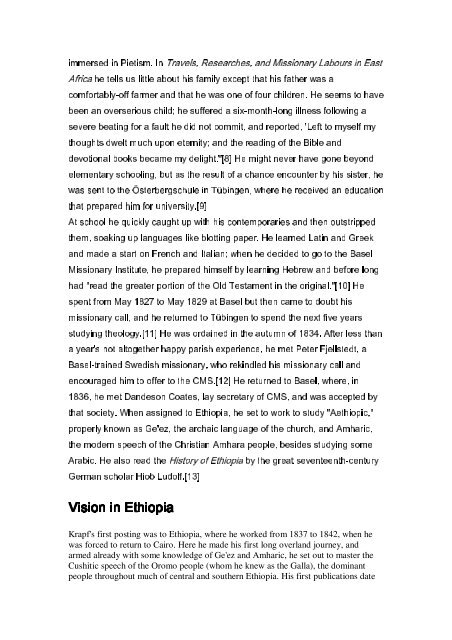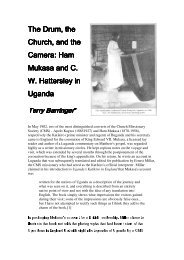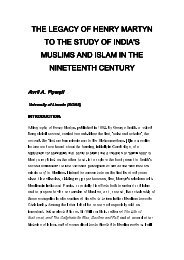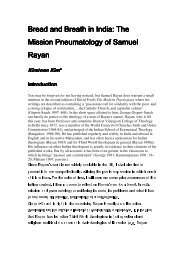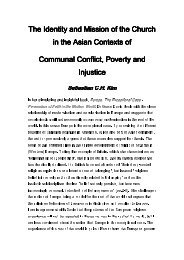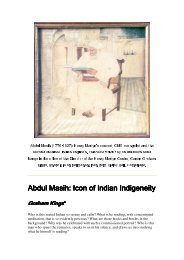The Legacy of Johann Ludwig Krapf - Henry Martyn Centre
The Legacy of Johann Ludwig Krapf - Henry Martyn Centre
The Legacy of Johann Ludwig Krapf - Henry Martyn Centre
You also want an ePaper? Increase the reach of your titles
YUMPU automatically turns print PDFs into web optimized ePapers that Google loves.
in Pietism. In Travels, Researches, and Missionary Labours in East Africa he tells us little about his family except that his father was a comfortably-<strong>of</strong>f farmer and that he was one <strong>of</strong> four children. He seems to have been an overserious child; he suffered a six-month-long illness following a severe beating for a fault he did not commit, and reported, 'Left to myself my immersed<br />
dwelt much upon eternity; and the reading <strong>of</strong> the Bible and devotional books became my delight."[8] He might never have gone beyond elementary schooling, but as the result <strong>of</strong> a chance encounter by his sister, he was sent to the Österbergschule in Tübingen, where he received an education that prepared him for university.[9] thoughts<br />
school he quickly caught up with his contemporaries and then outstripped them, soaking up languages like blotting paper. He learned Latin and Greek and made a start on French and Italian; when he decided to go to the Basel At<br />
Institute, he prepared himself by learning Hebrew and before long had "read the greater portion <strong>of</strong> the Old Testament in the original."[10] He spent from May 1827 to May 1829 at Basel but then came to doubt his missionary call, and he returned to Tübingen to spend the next five years studying theology.[11] He was ordained in the autumn <strong>of</strong> 1834. After less than Missionary<br />
year's not altogether happy parish experience, he met Peter Fjellstedt, a Basel-trained Swedish missionary, who rekindled his missionary call and encouraged him to <strong>of</strong>fer to the CMS.[12] He returned to Basel, where, in 1836, he met Dandeson Coates, lay secretary <strong>of</strong> CMS, and was accepted by that society. When assigned to Ethiopia, he set to work to study "Aethiopic," a<br />
known as Ge'ez, the archaic language <strong>of</strong> the church, and Amharic, the modern speech <strong>of</strong> the Christian Amhara people, besides studying some Arabic. He also read the History <strong>of</strong> Ethiopia by the great seventeenth-century properly<br />
Vision in Ethiopia<br />
<strong>Krapf</strong>'s first posting was to Ethiopia, where he worked from 1837 to 1842, when he<br />
was forced to return to Cairo. Here he made his first long overland journey, and<br />
armed already with some knowledge <strong>of</strong> Ge'ez and Amharic, he set out to master the<br />
Cushitic speech <strong>of</strong> the Oromo people (whom he knew as the Galla), the dominant<br />
people throughout much <strong>of</strong> central and southern Ethiopia. His first publications date<br />
scholar Hiob Ludolf.[13] Vision in Ethiopia Vision in Ethiopia Vision in Ethiopia German


